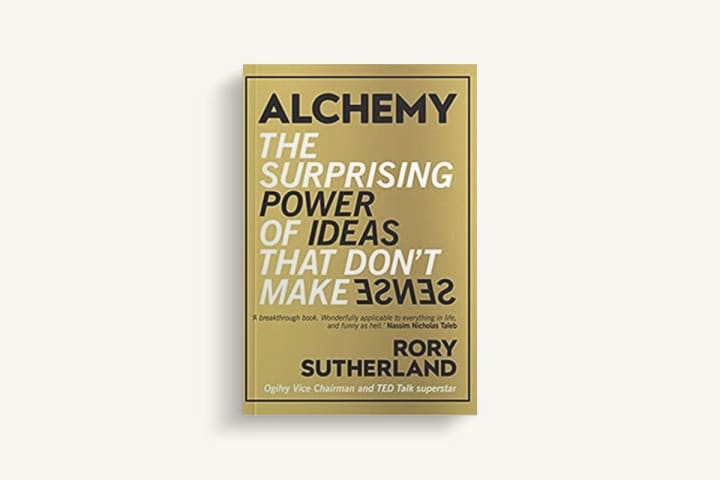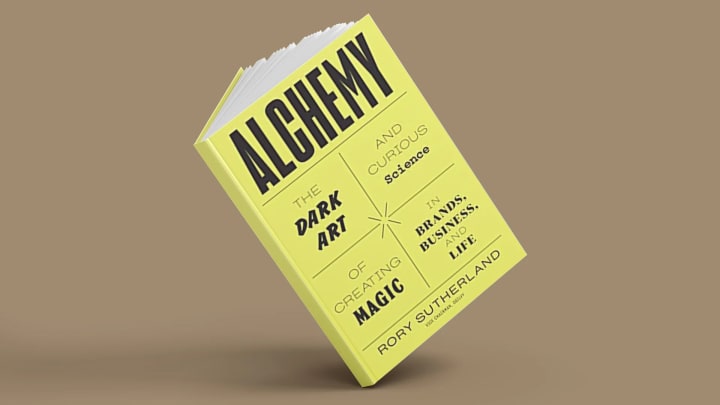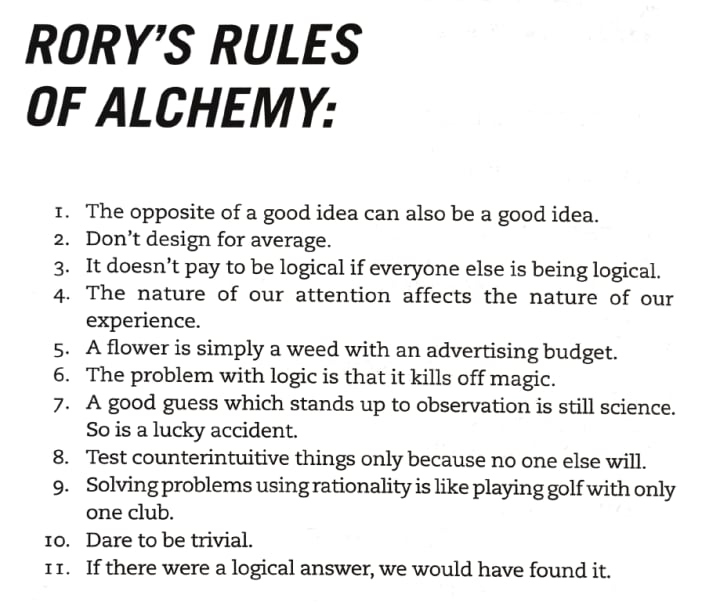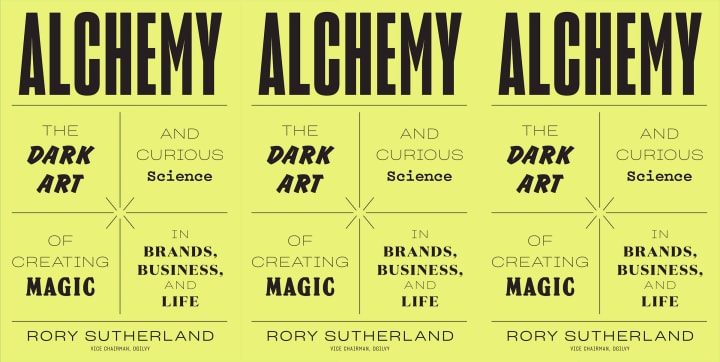Book Review: "Alchemy" by Rory Sutherland
5/5 - Magic might not exist, but this book is the next best thing...

The opposite of a good idea can be a good idea
"Alchemy" by Rory Sutherland
This book was more of a random pick-up and I know what you're going to say to me: Why are you all of a sudden reading so many nonfiction books? Well, it was my New Years' Resolution, I just didn't start acting on it until I found something I liked. Some of them have been really difficult to read because it made me realise I should have paid attention in biology at school, some of them are less difficult but more perplexing because they make me realise I've literally been ruining my own life and some of them, like Alchemy, have really interested me for some weird or unknown reason. And that's what this book is all about: weird and unknown reasons.
It starts off with a personal attack on my character: why do we all drink Red Bull but we all agree that it tastes terrible? It's mainly because of the nonsensical way that it is sold. Those weird winged adverts that rake in so many billions a year, enough (as the author states) to run a Formula One team among other products. Most of this book is about how we make some completely illogical decisions when buying and consuming and how advertisers must therefore take the time to see to these illogical (but not bad) decisions because not everything can be explained by logic and reason.
"Psychologic has made us a very successful breed of monkey..."
'Alchemy' by Rory Sutherland
He takes the example of religion and how it helps people. He looks at how going to church has some value for some people, improving their lives and giving them a sense of purpose. This is something that undeniably works. We don't know why it works, but we cannot ignore that it does work. This is where my thoughts about the author insulting Richard Dawkins were confirmed. Well articulated and brilliantly written, I have to say that there is a clear psychological requirement in any sort of innovation purely because humans are illogical animals. (Added points for using the Bob Dylan quotation in the introduction).

One thing I like about this book is that the introduction outlines every main point before you get into reading the main body. There are a lot of behavioural psychological references and all of these are made point by point in the introduction (which is hugely helpful by the way) before we get into the really deep stuff later on. Done with wit and intellect, the author seeks to make us less reliant on Wikipedia and Chat GPT as he gives examples of his own understandings and the understandings of others.
One of the way he does this is through Banana Liqueur, which a buyer thought tasted nice abroad and on holiday and so, bought the rights to sell it in the UK. However, when trying it back in the UK - he thought it was vomit-inducing. This is the example the author uses to describe context-dependent decisions and how nothing to a human being can be context-free. This turns into people making varying decisions depending on time, place and other people.
Another example he uses is shopping. We all like a bargain and we all like treating ourselves to something expensive because of the dopamine rush associated with both of them. But things that are properly priced in the middle seem to do neither of these things and therefore, go without being bought. Therefore, context is everything when getting people to buy things and getting people to enjoy what they are buying.

The author states that in order for a business to succeed, it needs to focus less on what people say and more on what people feel - this is because we cannot always articulate or explain what we feel. The reasons? We still do not quite know. But there are rationalisations we can always provide - these rationalisations may not always be completely true or explain the entire situation. This is done through the question:
"Why don't people like standing on trains?"
'Alchemy' by Rory Sutherland
When the author investigates how people make decisions, he looks at what is called 'behavioural economics' which mixes psychology with innovation and never really just presumes it knows what people need without thinking about how they feel. Looking at an example of how crime statistics in a 'lawless' place were lowered by painting the faces of babies and toddlers on to shop shutters (but was not really taken up by other places), we are shown how looking at people's emotions and how they react to them rather than teaching them how they should feel - works. I mean who wants to do something wrong in front of babies? Also, how the faces of babies and toddlers have a calming impact on the human mind.
The author looks at how the 1950s to the 1980s screwed up food culture because they were asking the wrong questions. For example: creating a culture of food convenience which led to the decline of any actual good food but an increase in efficiency. Therefore, the pleasure of cooking and eating food was taken away, but the efficiency was sped up. This is how economists tend to think. They solve a problem looking at how they would want people to think about it regardless of how the people would feel about it. When in reality, as the author states, they should be looking at how the people feel about something that they require a solution to - so this will reframe the problem from one thing to another. Range reducing and having the illusion of choice may seem logical, but it makes for a miserable existence for the people living within the structures. The author gives several examples for how people who think a bit differently tend to get the answers to functional questions correct more often than those who are logical and straight-thinking.

Another part of the book I enjoyed was where the author talks about how it is not what the question is but how you frame the question. It is a lesson on how everything is context dependent and the author takes the example of high end restaurants offering 'still or sparkling water'. This makes it very difficult for the person receiving the water to say 'tap water' because they have been given two conditions for the context of the question.
"Bulls*** x Bulls*** = Bulls***(sq.)"
- 'Alchemy' by Rory Sutherland
I think I have learnt quite a bit about pricing models from this book as well because the author states that economists tend to look at what 100 people may use once, but not really look at what one person may use 100 times. Looking at both of these contexts changes the way something is designed. His examples include things like railway season tickets. Why? because what 100 people would pay for once is not the same as what one person may spend 100 times on and the latter seems to make for a more loyal customer base.
Thers is also a part where he looks at how prejudice depends on context and how we are boxed in by our definition of diversity. For example: one woman in an applicant pool full of men normally stands no chance of getting the job, but putting two women in the same pool increases the chances of a woman getting the job. On the other hand, there is a clear oddity to how we define diversity on terms of race. Race seems to mean colour to most people and therefore misses the nuances of individual races entirely. Whereas, there is also the context of diversity and how it depends on where you are working. For example: the author talks about advertising as that is the realm in which he has worked and researched for a while. Advertising almost exclusively employs good looking people to star in their adverts and never really employs people who are representative of a general population of anywhere.

From scaling up the decision to buy a chocolate bar to buying a house to how people who are conventional logical tend to put their businesses into peril in the long term and all the way to how we tend to buy single-use items with the exception of the mobile phone. Confidence, trust, signalling and a whole bunch of other things teach us why we are not only social creatures, but our dependence on items links to our social habits, our behaviours and most importantly, our feelings. An incredibly mind-blowing book which has taught me so much about how advertising actually works, I think I am going to struggle to shake off some of the new thoughts this book has given me. I may not believe magic exists, but this is the closest thing.
About the Creator
Annie Kapur
200K+ Reads on Vocal.
English Lecturer
🎓Literature & Writing (B.A)
🎓Film & Writing (M.A)
🎓Secondary English Education (PgDipEd) (QTS)
📍Birmingham, UK
Reader insights
Outstanding
Excellent work. Looking forward to reading more!
Top insights
Expert insights and opinions
Arguments were carefully researched and presented
Eye opening
Niche topic & fresh perspectives
Heartfelt and relatable
The story invoked strong personal emotions






Comments (3)
Very nice work
Meticulous storytelling as always
Amazing 🤩🤩 excellent story